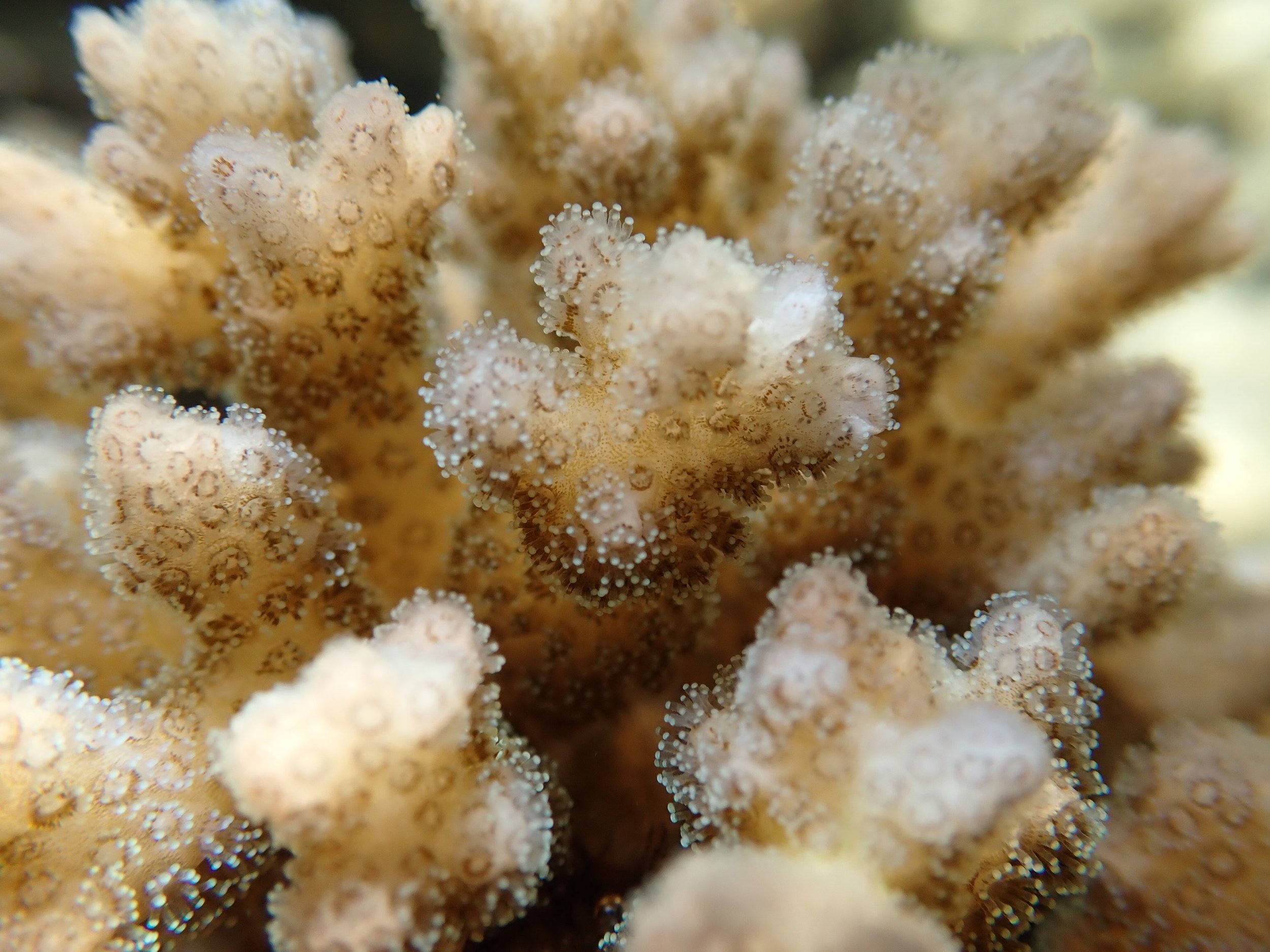CURRENT PROJECTS
defining physiological thresholds
BLEACHING VARIATION AND SUSCEPTIBILITY OF CORALS
Status: 2012 - ongoing
Collaborators: Texas A&M University-Corpus Christi, Hawaiʻi Institute of Marine Biology, Santa Monica College
Why do some corals bleach and others do not? We are currently investigating the underlying traits that may be responsible for bleaching variation and susceptibility of corals to bleaching and ultimately climate change.
Sediment Impacts on Corals
Funding: Florida Department of Environmental Protection (FDEP)
Status: 2016 - ongoing
Collaborators: Texas A&M University-Corpus Christi, Hawaiʻi Institute of Marine Biology, US Geological Survey, US EPA, FDEP
This research investigates the impacts of suspended sediment on the growth, survival, and health of corals. Specifically analyzing the effects on coral metabolism, calcification, photosynthetic efficiency, and algal symbiont abundance. This series of projects aims to determine the biologically relevant benchmark of turbidity for corals with a special focus on ESA-listed coral species or those susceptible to SCTLD.
M.Sc. Student, Zoe Ruben and assistant Matilda Phillips conducting experimental work in summer 2021 at the Hawaiʻi Institute of Marine Biology.
Nutrient and warming impacts on corals
Funding: Texas Comprehensive Research Fund
Status: 2021 - ongoing
Collaborators: Texas A&M University-Corpus Christi, University of Oxford
This project examines how the coral holobiont responds to thermal stress and nutrient loading and what taxonomic shifts in the microbiome may be driving phenotypic bleaching responses. The proposed work will employ a complimentary blend of multi-omics approaches (e.g., metagenomics and metabolomics) as well as ecology, microbiology, chemistry, geospatial/geographic information science, and computational biology.
Ocean Acidification impacts on Calcification
The Proton Flux Hypothesis visual representation by K. Bahr.
All rights reserved.
As processes, photosynthesis and calcification compete for dissolved inorganic carbon (DIC). Corals uptake DIC as bicarbonate (HCO3-) to form calcium carbonate (CaCO3) with a proton (H+) as a waste product. This proton must then be removed from the coral to prevent acidosis inside the tissues. The protons are dissipated through the boundary layer into the bulk seawater by diffusion from high to low concentrations. Under ocean acidification (OA) conditions, more DIC is available however coral calcification is limited by the increasing concentration of protons in the bulk water due to OA.
The Proton Flux Hypothesis
Funding: NSF BIO-OCE #2049406
Status: 2021 - ongoing
Collaborators: University of Hawaiʻi at Mānoa, Hawaiʻi Institute of Marine Biology, Texas A&M University-Corpus Christi
Developed by the late Dr. Paul Jokiel, the Proton Flux Hypothesis explains that coral calcification is limited by diffusion of the calcification waste product, protons, out of the calcification compartment. The flux of protons across the biological coral membrane is diffusion limited by the net proton transport through the boundary layer, which is hindered by increasing proton concentration due to ocean acidification in the seawater.
In honor of Dr. Paul Jokiel, we will continue examining and testing his Proton Flux Hypothesis through experimental physiology and metabolic response of coral reefs in relation to ocean acidification and global warming.
proton flux: ION TRANSPORT MECHANISMS
Status: Ongoing
Lead: Ph.D. student David Armstrong
Coral growth relies on a specific process called calcification, dependent on certain substances at adequate levels while managing waste. The balance between these substances, impacted by seawater changes, is crucial. With our oceans' carbon chemistry changing rapidly, this balance is at risk. If these changes hinder coral growth and vital processes, entire coral reef systems could degrade. This study investigates how this imbalance affects coral survival under stress, like limited substances or lower seawater pH.
Proton Flux: RNA TRANSCRIPT effects on CALCIFICATION
Status: Ongoing
Lead: Ph.D. student David Armstrong
Corals uniquely calcify through biological regulation and depend on consistent seawater chemistries to sustain growth. Genomic expression drives these processes as mRNA codes for regulatory proteins and enzymes, which could have differential expression related to external fluxes in seawater chemistries as a result of climate change. Uncertainty surrounds how biologically regulated calcification will persist through these conditions. In this study we aim to quantify RNA transcripts related to calcification to better understand the stressors placed on similar organisms.
HIGH CO2 STRESS ON CORALS
Status: Ongoing
Lead: Ph.D. student, David Armstrong
Coral reefs support an incredible amount of biodiversity within their unique marine ecosystems and serve as the foundation for ecological processes essential in supporting ocean life. Two highly productive processes are growth via synthesizing calcium carbonate and photosynthesis through internal autotrophic algae. Corals facilitate these processes with ions and gases present in the seawater, which are concentrated at the coral surface. This concentration forms a microlayer of seawater surrounding the coral and is essential for facilitating growth and photosynthesis. Increases of anthropogenic CO2–termed ocean acidification, has resulted in great uncertainty for these essential ecosystem processes. In this study we utilize specialized microsensors to sample the microenvironment surrounding two coral species exposed to high pCO2 conditions to explore how the processes are affected by elevated pCO2.
proton flux: Influence of water movement on coral calcification
Status: Ongoing
Lead: M.Sc student Bryanna Herrara
Water chemistry plays a crucial role in the process of coral calcification. Recent research highlights how water movement influences coral growth and can contribute to its speed. However, the constantly changing acidity of the oceans has led to a significant decline in coral calcification. We believe this decline is linked to an accumulation of hydrogen ions in the water. Consequently, our goal is to study the boundary layers at an individual level to uncover the mechanisms behind coral calcification. This research will provide valuable insights into addressing ocean acidification and developing strategies to safeguard coral reefs in the future.















